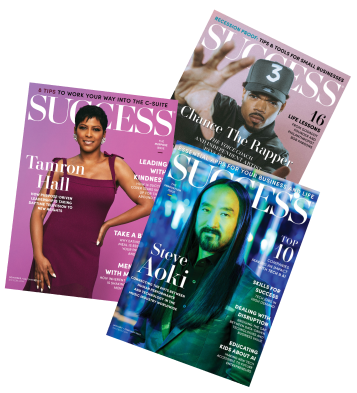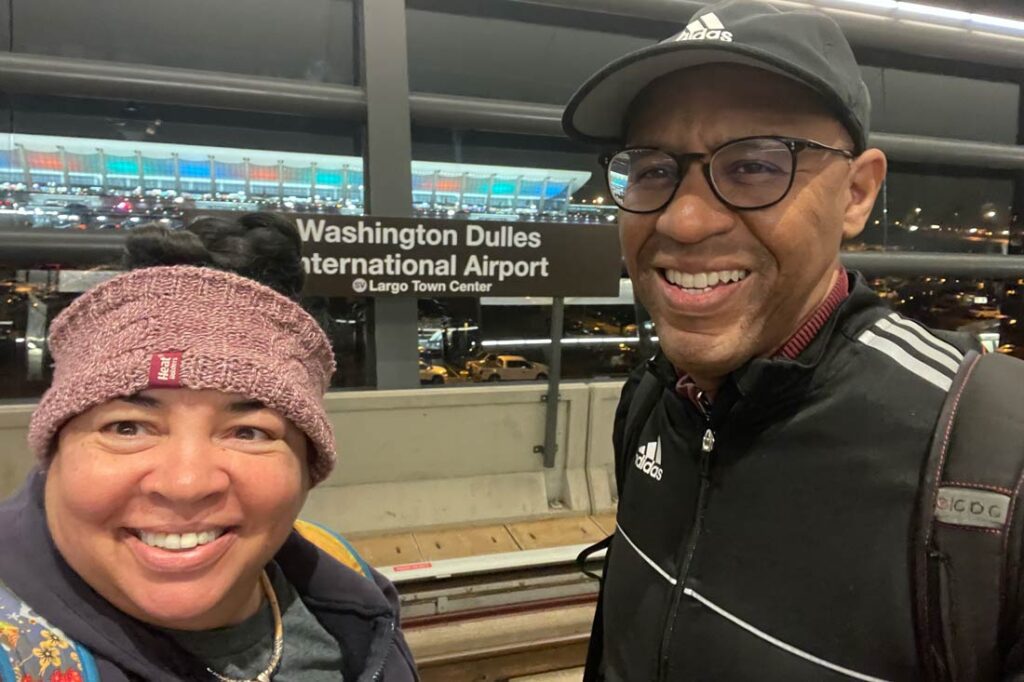Husband-and-wife team Ian and Tonya Fitzpatrick are founders and hosts of the World Footprints travel podcast. Even though they are now married and hosting a successful podcast together, they almost didn’t meet. When Tonya, a lawyer, first met Ian, she wasn’t interested in dating anyone. Ian’s cousin, who knew Tonya from college, attempted to be a matchmaker for the pair, but he soon learned it wasn’t going to be an easy match.
After hearing that Ian was also a lawyer, Tonya’s response was, “Oh, hell no. I don’t want to meet him.” But she softened to the idea of connecting with him when she learned that, like her, Ian was from the Midwest (they were living in Washington, D.C., at the time). She explains, “I was really looking for people with Midwest values.”
Her next question to Ian’s cousin would be the deciding factor. She asked, “Does he have a passport and are there stamps in it?” Since she had recently returned from living abroad, it was important to her that any potential suitor valued travel. “I wasn’t interested in battling with another person, particularly another lawyer, about my view of the world,” she says. Fortunately, Ian had traveled internationally for university exchange programs, so she agreed to have dinner with him.
A shared love of travel between Ian and Tonya Fitzpatrick started the whole adventure
“Essentially our lives actually started off with travel,” says Tonya. Ian proposed to Tonya during a surprise trip to Toronto. “I didn’t know where we were going until we got to the airport and I saw the airport code,” says Tonya Fitzpatrick. After checking into their hotel, they boarded a prop plane. “Just about the time I started to get a little bit nauseous because of this prop plane, another plane comes by us in the opposite direction carrying a banner that says, ‘Marry me, Tonya. I heart you.’” Their 2005 wedding was like their proposal—at a distant destination—but this time it was in the tropical location of Bermuda. “We took some of our closest family and friends to Bermuda for what was a pretty extraordinary weekend,” says Ian.
A chance meeting with a life coach changed the course of their lives
Shortly thereafter, during a trip to San Francisco, Tonya and Ian met a life coach at a hotel cocktail hour who ended up changing their career path. The life coach posed some questions that helped the couple define their passions. “My two passions I had were travel and horses. And we thought, ‘How can we form a business?’” explains Tonya. Since owning horses would be an expensive venture, they opted to create a travel agency. “We started it [the travel agency] with the intention of making sure our clients had a transformative travel experience,” says Tonya.

Within three years of owning their travel agency, Bronze World, their company was on track to earn a quarter million dollars. Despite their financial success, they decided to focus instead on their travel podcast that they created in 2007, and they closed their travel agency in 2009. At the time it was too difficult for them to run a podcast and travel agency. “The passion really was for travel, not selling travel,” says Ian. “The media side gave us a bigger microphone, to share the things that we wanted to share about the world and about travel,” says Tonya. Another reason they closed the travel agency is because The White House had offered Tonya a job as the deputy assistant secretary for civil rights at the Department of Education.
Launching the World Footprints podcast
Initially, their travel podcast was on a radio station as a travel talk show called, Traveling On. They then rebranded in 2010, changing the name to World Footprints and moving to a digital platform. “World Footprints, I think, has a more impactful title and indicates the impact of the footprints we are leaving around the world, and the socially-conscious messages that we’re sharing,” says Tonya Fitzpatrick.
The move to podcasting from radio was challenging. It was “in the nascent stages of podcasting. We really didn’t know what we were doing,” Ian says. “In this space we knew that we wanted to do something a little more uplifting, a little more insightful than, ‘Where’s the best beach, Where’s the cheapest cruise?’ and the typical kind of vacation-oriented, value-oriented consumer based travel shows.”
The podcast also allowed them to have more freedom over the type of content they produced. “They [the radio station] were conservative, and we’re pushing socially-conscious dialogues. So there was a little bit of a conflict there,” says Tonya. Before launching a podcast, they moved to a more liberal radio station—but the station was then bought by Dan Snyder, who switched gears to air mostly sports-related content.
The duo finances their podcast with their own money. “[The podcast] was bootstrapped by us… and even though there is more revenue coming in, the business model has shifted somewhat, but it’s still a passion project, even at this point in its evolution,” Ian explains. “The economics remain challenging for podcasting, and for media in general, and we’re not immune to that. But we’re still here, and we’re evolving and moving forward, which is all that we really can do.”
They both still work as lawyers, but they have grown their podcast business. “Now we have a partnership with MSN.com,” Tonya says.
Inspiring people to be transformed by their travels
The main focus of their podcast is on the “transformative power of travel,” and their content is geared toward conscientious travelers. They aim to share untold stories while incorporating social justice. One of Tonya’s favorite podcasts is about the Deaf Heritage Trail in Martha’s Vineyard. “Even people who visit Martha’s Vineyard regularly don’t know about the Deaf Heritage Trail and the background of the deaf community—the largest deaf community in the country [at one point in history], which was concentrated there,” she says.
Besides sharing untold stories, they’ve had the opportunity to interview some well-known people like Maya Angelou. There are “multi-dimensional aspects about who we are, and our journey, that we are able to infuse into the podcast and fuse into the conversation that hopefully leads to some interesting places and some interesting conversations with people from all walks of life who like to share their journey [and] like to share their travels,” says Ian.
If you are thinking of starting your own podcast, these veterans shared some tips. “I would suggest that they find their voice and stick with it,” says Tonya. Sometimes people “try to appeal to everybody, and you can’t do that.” Ian agrees and advises, “You just have to be yourself and know who you are.”
Photo courtesy of Tonya Fitzpatrick.



